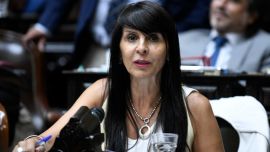Eduardo Lorenzo, an Argentine priest accused of a series of sexual abuses against children, committed suicide Monday, just hours after Judge Marcela Garmendia ordered his arrest.
The priest’s death renewed debates about the impact of the Catholic Church’s ongoing sex scandal and the inefficacy of attempted soutions thus far.
Monsignor John Kennedy, who runs the Congregation for the Doctrine of Faith (CDF), the Vatican entity responsible for processing clergy sex abuse complaints, told the Associated Press his office received a record 1,000 denunciations this year, describing the congregation as “overwhelmed” by a “tsunami.”
Argentina has joined the United States as one of the countries sending the highest number of cases to CDF.
According to law enforcement sources, Lorenzo’s body was found at the La Plata offices of Caritas, the Catholic social services organisation where he worked and lived. They found him “on the floor,” with multiple “blood stains and a firearm.”
He had reportedly learnt of the arrest warrant just hours before, Efe reported.
The Network of Survivors of Ecclesiastic Abuse in Argentina issued a statement responding to Lorenzo’s suicide. “His death confirms the victims told and always tell the truth,” it said. “We highlight that even in this situation, the only victims are the survivors of Eduardo Lorenzo.”
The judge’s detention order arrived 11 years after Lorenzo was first denounced for alleged sexual abuse. Victims spoke out about a series of attacks that allegedly took place at San Benito church between 1990 and 1995 and at another church between 1999 and 2001. Both churches are in La Plata, Buenos Aires Province.
VICTIMS
However, the accusations didn’t end there, according to local media reported in La Plata.
Earlier this year, Lorenzo was set to transfer to a parish in the city’s Tolosa barrio. Public outcry began when allegations of abuse from 2008 next door in the neighbourhood of Gonnet were outed, as was the case being “dropped” and the Church’s conclusion there was no basis for the charges. Ultimately, the archdiocese halted the transfer, though Archbishop Victor Maneul Fernández of La Plata did co-celebrate a Mass with Lorenzo in Gonnet in March.
Victims who spoke out against Lorenzo listed a wide-range of tactics the priest used to sexually abuse young boys in the parishes. Summer camps, sex games, group showers, dinner parties, and other activities were allegedly used to achieve his “sexual end goals.”
Roberto, one of the victims, recalled Lorenzo asking groups teenage men to show their genitalia and speak badly about women.
Julián, another victim, also highlighted Lorenzo’s distaste for women, which he said was made obvious through the priest’s language in describing them.
Roberto shared how he would be asked to hang back after dinner parties, leaving him alone with Lorenzo. “As a 13-year-old boy, I felt happy that Lorenzo picked me to share these moments,” he said.
Victims say the priest fondled children while they were in their sleeping bags at summer camp. He’d occasionally invite his “preferred group” to the parochial house to sleep, where they’d drink alcohol — especially whiskey — and play games that almost always ended with him committing sexual acts with one of the boys, according to victims.
Despite the accusations made as early as the 1990s, Lorenzo was never relieved of his role, nor did he stop this behaviour, it appears. He also didn’t stop going to the Buenos Aires Penitentiary Service, where he served as the official chaplain until this past April.
While there, he solidified his relationship with Julio César Grassi, one of Argentina’s most well-known Church abusers who was sentenced to 15 years in prison for sexual assault and corruption of minors.
Lorenzo and Grassi became friends, Lorenzo even regularly hearing the confession of Grassi over the course of his tenure as chaplain.
The late priest continuously denied the allegations, and the archbishop’s office defended him stalwartly. It posted Lorenzo’s innocence statement on the website.
His death was lamented by Archbishop Fernández and his life honoured in a celebratory Mass in La Plata Wednesday.
‘OBLIGATIONS OF SILENCE’
T h e C a t h o l i c Church’s moral superiority has been blunted by the secrecy and protection it appears to provide clergymen accused of sexual abuse. It’s long justified its silence u s i n g t h e principle of “pontifical secrecy,” intended to p r o t e c t sensitive information passed betw e e n the Vat i c a n a n d other “papal embassies.”
However, in recent years, the rule, which threatens ex-communication if disobeyed, was used as a reason to keep quiet on judicial cases, and often allowed Church officials to avoid cooperation with law enforcement or neglect to report complaints altogether.
Pope Francis, who hails from Argentina, announced the repeal of pontifical secrecy in sex abuse cases Tuesday, allegedly facilitating civil agencies access to information and “unbinding” anyone associated with the case — witnesses, alleged victims, the person who filed the report and those working in Church offices — from “obligations of silence.”
While the move was celebrated by some as a step towards reform, the Network of Survivors of Ecclesiastic Abuse in Argentina countered it didn’t represent a “real or effective advance.” A statement on the group’s Facebook page said the papal decree “demonstrated a profound underappreciation for the life and physical and emotional health of the violated.”
The Network says raising the rule
only requires the Church to give responses to judicial authorities, not to
the “principle interested persons,” the
victims. It also believes the decree
fails to eschew the bureaucracy of the
Church, allows officials to
“manipulate information”
to “guarantee security, integrity and confidentiality,” favours the abuser
and continues to protect
any revelations made
during Confession. related news



















Comments